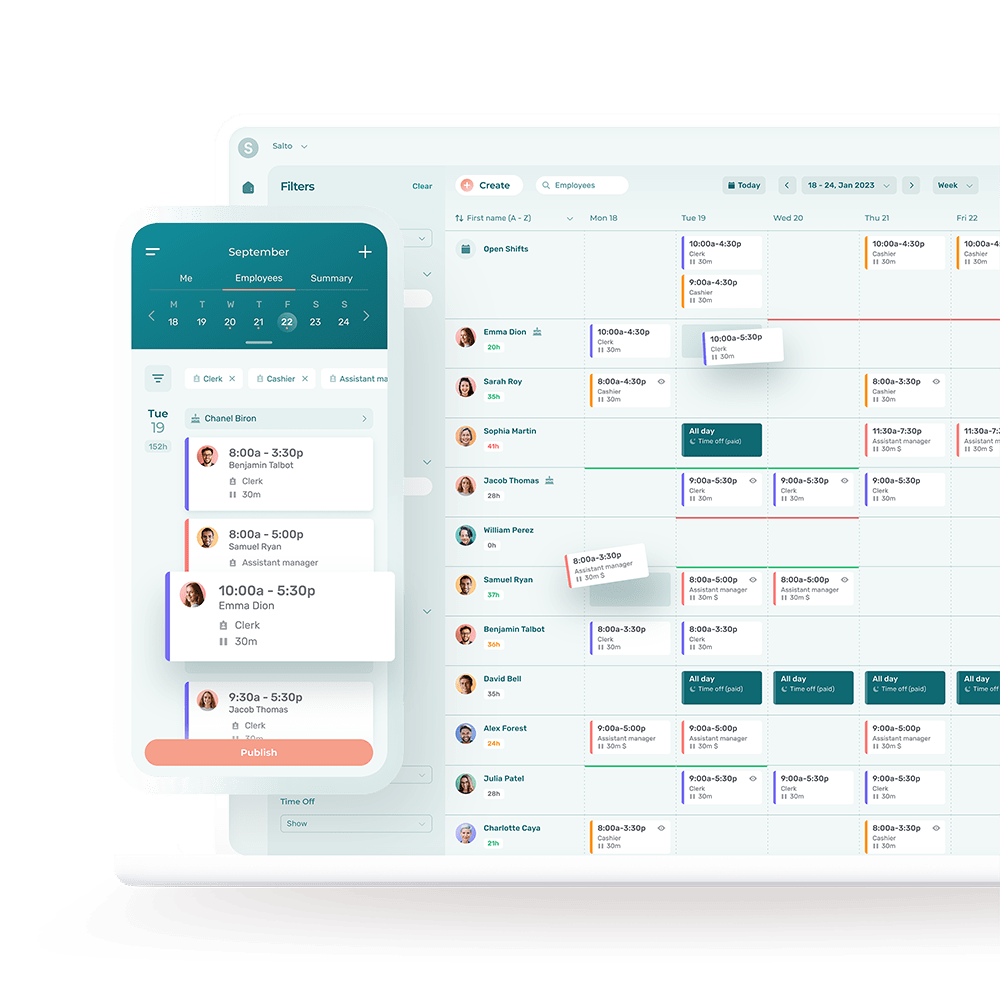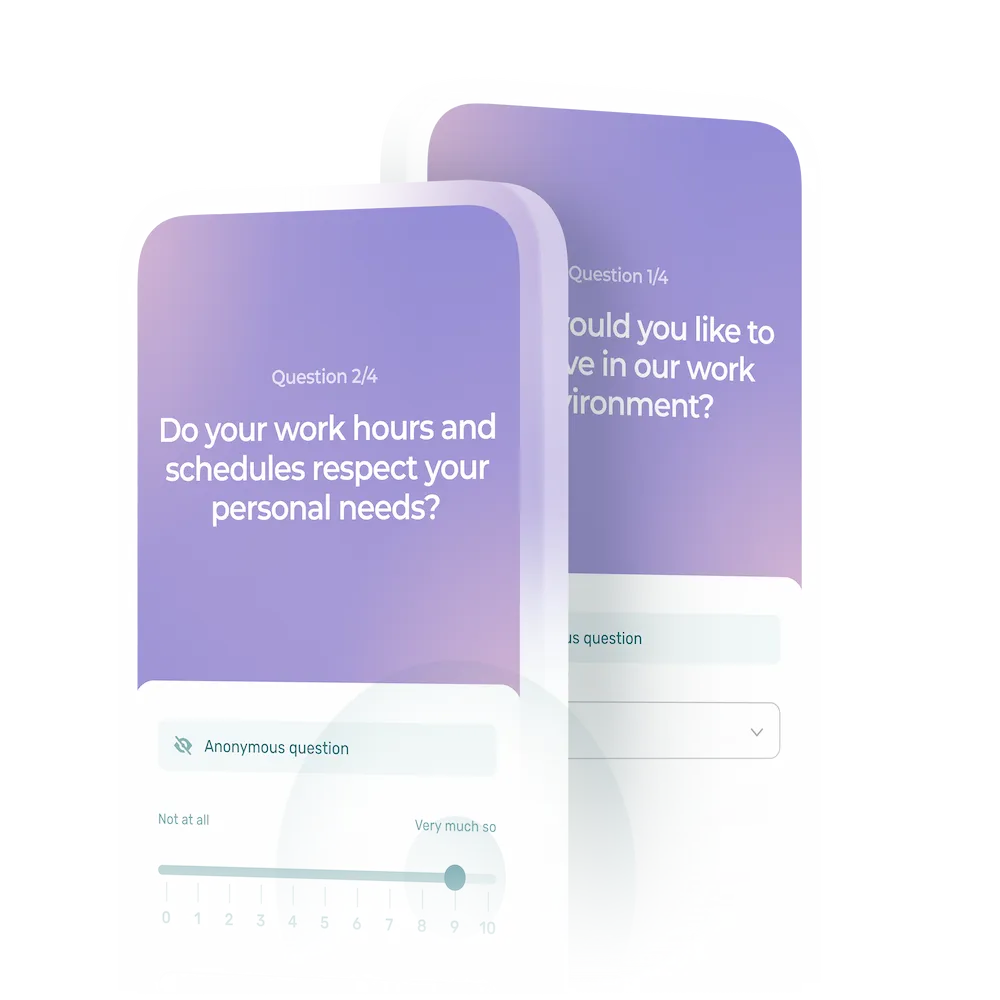In the restaurant business, having a competent team is essential for operational efficiency, excellent customer service, and overall profitability. Knowing how to identify candidates who are a good fit, will work hard, and do a good job is essential.
We have compiled the most common restaurant interview questions to ask potential candidates so that you can find the right person to hire.
15 Restaurant Interview Questions
Knowing how to manage restaurant staff well is key to success in the hospitality business. Just as important is knowing how to hire the right person applying for your open restaurant job.
The following are the most common restaurant questions restaurant managers should ask. These questions cover a wide range of areas pertinent to the restaurant industry, from technical skills and experience to soft skills and cultural fit.
We also include the reasoning for these common restaurant interview questions and provide example answers from candidates during restaurant interviews.
These interview questions and answers will help you stay focused on the core skill set you’re trying to assess.
For a more productive and informative interview, you can tailor your interview questions to:
- Your restaurant’s specific needs and values and the specific role.
- If the candidate has extensive previous restaurant experience and what their career goals are.
Restaurant interview questions and answers will differ greatly for:
- Candidates with extensive past experience in the food and service industry hoping to land their first restaurant manager job.
- High school students looking for their first restaurant job at a fast food restaurant.
1. Can you describe a time when you had to deal with an angry customer or particularly difficult customer?
- Why ask: this will provide insight on the candidate’s problem solving skills and how they ensure good customer service.
- What to look for: ability to stay calm, handle conflict diplomatically, and ensure customer satisfaction.
2. What do you think is the most important quality in a team member in the restaurant industry?
- Why ask: this assesses the candidate’s understanding of industry demands and what it means to be a team player.
- What to look for: values like reliability, communication, and adaptability, along with the willingness to be a team player who will go the extra mile.
3. Describe a time when you had to handle multiple responsibilities at once. How did you prioritize?
- Why ask: this evaluates multitasking and time management skills.
- What to look for: effective prioritization, organization, and ability to maintain service quality under pressure.
Need a faster way to zip through interview questions and answers?
Download our free Word interview guide template
4. How do you handle working in a fast paced environment with stressful situations or high-pressure periods, like lunch or dinner rushes?
- Why ask: this gauges stress management abilities and readiness to handle peak restaurant hours.
- What to look for: techniques to stay calm, efficient workflow strategies, and emphasis on teamwork.
5. If a team member calls in sick and can’t come to work, how would you handle the situation?
- Why ask: this assesses adaptability and problem-solving in unexpected situations. A great question for aspiring managers.
- What to look for: proactive approach, ability to redistribute tasks, or willingness to take on extra duties.
6. Why did you choose to work in the restaurant industry?
- Why ask: this clarifies the candidate’s motivation and passion for the industry.
- What to look for: genuine interest in food, service, or the communal spirit of restaurants.
7. How do you deal with feedback or criticism from supervisors?
- Why ask: this evaluates receptiveness to feedback and a growth mindset.
- What to look for: open-mindedness, a desire to learn, and taking feedback constructively.
8. What do you do if you don’t know the answer to a customer’s question or if they have a request you’re unfamiliar with?
- Why ask: this tells you if the candidate has good problem-solving skills and excellent customer service skills.
- What to look for: willingness to ask for help, honesty with customers, and a proactive approach to finding solutions—such as customers with food allergies.
9. Describe your experience with point-of-sale systems, reservations platforms, or any other relevant restaurant software.
- Why ask: This evaluates familiarity with common restaurant tools and technology.
- What to look for: hands-on experience, ability to learn new platforms quickly, or previous training.
10. How would you handle a situation where a coworker is not pulling their weight?
- Why ask: this gauges interpersonal skills and teamwork dynamics.
- What to look for: effective communication strategies, willingness to support team members, and a balance between understanding and assertiveness.
11. Have you worked in the restaurant industry before?
- Why ask: this gauges the candidate’s familiarity with the industry’s dynamics, challenges, and specifics.
- What to look for: prior experience can be an asset, but the lack of it isn’t necessarily a drawback. It’s essential to understand if they’re quick learners or if their past roles in other sectors might bring a fresh perspective.
12. What suggestions would you make to improve the guest’s dining experience?
- Why ask: this assesses the candidate’s understanding of customer service and proactive thinking.
- What to look for: creative and practical suggestions, indicating they’re customer-focused and continually thinking about service quality.
13. How would you handle a situation if there’s a conflict with a team member during a shift?
- Why ask: this evaluates interpersonal skills and conflict resolution abilities.
- What to look for: a diplomatic approach that prioritizes team harmony and guest experience. Ask can showcase their conflict resolution skills.
14. What is your method for ensuring cleanliness and hygiene standards in your work area?
- Why ask: this checks the candidate’s awareness and commitment to these standards.
- What to look for: specific routines or checklists they follow, understanding of food safety practices, and recognition of the importance of cleanliness for both guest experience and safety.
15. How would you handle a situation where you made an error, such as mixing up orders?
- Why ask: this evaluates responsibility, problem-solving, and customer service skills.
- What to look for: taking responsibility for the mistake, quick corrective action, and possibly compensatory measures for the guest. It’s also helpful if they can cite a lesson learned from past errors.
Discover why so many restaurants trust Agendrix to handle their HR and schedule management needs.
Best Practices for Interviews in the Restaurant Industry
There are best practices every restaurant manager can follow to ensure an efficient interview with potential restaurant workers. These practices will create a more positive interview experience and make it easier for hiring managers to identify the best candidate.
Keep in mind that these practices may need to be modified slightly based on the restaurant job you need to fill. You might need to take a slightly different approach if it’s an entry-level server position versus if you’re looking for a natural leader to step-in as restaurant manager to manage your whole team.
Steps in the interview process:
Preparing for the Interview
Review the job description
Make sure you thoroughly understand the role’s requirements and the key skills needed.
Choose an appropriate venue
Choose a quiet, comfortable location for the interview to ensure privacy and minimize disruptions.
Review resumes
Familiarize yourself with the candidate’s background to tailor your questions.
Prepare questions
Draft a list of relevant questions in advance, focusing on the candidate’s skills, past experience, and cultural fit.
Stay updated on legalities
Be aware of the legal restrictions on questions (e.g., questions about age, race, religion, etc. are off-limits in many countries).
Conducting the Interview
Start with an introduction
Begin by introducing yourself and providing a brief overview of the restaurant’s culture and values. You may also want to briefly discuss certain HR policies regarding shift scheduling, shift swapping, time & attendance, and ways to clock in for shifts.
Ask open-ended questions
Ask questions that encourage detailed responses about the candidate’s previous experience at their last job rather than simple ‘yes’ or ‘no’ answers.
Ask behavioral questions
Use scenario-based questions to understand how candidates might react in specific situations. Ask how they handle high pressure situations, demanding customers, or what their greatest weakness is. This can tell you if they are the right person for the restaurant job.
Listen actively
Give candidates your full attention. Avoid interrupting and show genuine interest, whether they give a great answer or not.
Maintain neutrality
Avoid showing judgment, bias, or strong reactions to answers.
Clarify doubts
If a candidate’s response is unclear, ask follow up questions or drill deeping into one point of particular importance for the specific position. This will give you a better idea of whether or not the individual is the right candidate for your fast paced environment.
Offer a restaurant tour
If feasible, giving a brief tour can provide candidates a sense of the work environment for their new restaurant job.
Evaluating the Candidate
Consider the whole picture
Look at the candidate’s combination of key skills, experience, personality, and cultural fit.
Check references
Contact previous employers or references to verify the candidate’s background and work ethic.
Download our free Reference Check Consent and Release Form
Trust instincts, but avoid biases
While gut feelings can be useful, ensure decisions aren’t based on personal biases or stereotypes.
Post-Interview
Document observations
Jot down your impressions and observations immediately after the interview while they’re fresh. Add this information to your employee records for future reference. This is particularly important if you are managing employees for multiple job sites.
Follow up
Inform candidates of their application status in a timely manner. If selected, provide more information about your onboarding process to secure their commitment.
Provide feedback
Give constructive feedback after the decision-making process. Don’t leave candidates hanging by ghosting them.
General Tips
Be professional
Always maintain professionalism, from greeting the candidate to concluding the interview.
Be consistent
While each interview will be unique, aim for a consistent structure and approach for each candidate to ensure fairness.
Be adaptable
Be prepared to adapt the interview if it’s not progressing as intended or if the candidate’s responses require a change in direction.
Be respectful
Begin and end the interview on time, showing respect for the candidate’s schedule.
Be confidential
Ensure that the details of the interview and the candidate’s information remain confidential.
Continuous Improvement
Self-evaluation
Periodically review your interviewing techniques and seek feedback from colleagues or candidates to improve, such as through surveys.
Stay updated
Keep abreast of the latest interviewing techniques, trends, and best practices in the restaurant industry.
Employee Corner: 23 Questions to Ask Your Interviewer to Ensure the Restaurant Is a Good Fit
Candidates applying for a restaurant job should also ask questions during the interview. It demonstrates genuine interest in the job and the restaurant itself. It also helps them assess their fit within the team, clarify role expectations, and make informed decisions about potential employment.
Candidates can pick and choose from the following list of questions to pinpoint aspects of the job they feel are most important to them.
1. Can you describe the restaurant’s culture and values?
Reason: Understanding the culture can help determine if it aligns with your personal values and work style. Knowing how the restaurant handles an angry customer, for example, can be a good indication of its culture.
2. What do you believe sets this restaurant apart from its competitors?
Reason: This offers insight into the restaurant’s unique selling points, showing its market positioning and competitive edge.
3. How would you describe the typical customer of the restaurant?
Reason: Knowing the primary customer base can set expectations about service demands and customer interactions.
4. Can you provide more details about the day-to-day responsibilities of this role?
Reason: This helps clarify daily tasks and expectations, ensuring you know what’s required in the role.
5. What are the busiest times or seasons for this restaurant, and how does the role adapt during these periods?
Reason: Understanding peak periods helps gauge the demands and pressures you might face.
6. Are there opportunities for cross-training in other positions?
Reason: Cross-training opportunities indicate the potential for skill growth and varied experience.
7. Can you describe the dynamics of the team I would be working with?
Reason: This provides insight into team structure and relationships, which is key for understanding your new fast paced environment.
8. How do you handle conflicts or disagreements among staff?
Reason: This reveals the management approach to resolving issues, indicating a supportive or confrontational environment.
9. What’s the management style of the immediate supervisor or manager for this position?
Reason: Knowing the management style can help assess your compatibility with the leadership approach, including communication with employees.
10. What kind of training programs does the restaurant offer to new hires? How do you onboard new staff?
Reason: This information will tell you if the restaurant has a well thought out employee onboarding or training plan. In other words, how much time and effort it invests in employee engagement, growth, and success.
11. Are there opportunities for professional development or growth within the company?
Reason: This can show long-term prospects within the establishment, pointing to career progression.
12. How often are performance reviews conducted, and how do they influence an employee’s growth within the restaurant?
Reason: Performance reviews are indicators of feedback frequency and the potential for promotions or raises.
Download our free Word Performance Review Template
13. What are the typical shifts or working hours for this position?
Reason: Knowing your shift schedule helps set clear expectations about working hours, scheduling shifts, and work-life balance.
Download our free Employee Availability Form Template
14. How is scheduling managed, and how much flexibility is there?
Reason: Scheduling insights can show how adaptable the restaurant is to personal needs or unforeseen circumstances when scheduling shifts, such as by making it easy for employees to swap shifts when needed.
15. Are there expectations for working during holidays, weekends, or special events?
Reason: Understanding these expectations can help in planning personal time and assessing potential work demands.
16. Apart from the base pay, are there other forms of compensation, like tips, bonuses, or commission structures?
Reason: This offers a complete picture of the potential earnings from the position. It also will tell you from day one if tips are shared among different roles.
17. Can you provide details about the benefits package, including health benefits, time-off, or meal discounts?
Reason: Benefits can significantly influence job satisfaction and are vital for understanding the full compensation package.
Download our free Vacation Request Form Template
18. Are there any imminent changes planned for the restaurant, such as renovations, menu changes, or expansions?
Reason: This provides insight into the future direction of the restaurant and potential shifts in roles or responsibilities.
19. How does the restaurant handle feedback from customers?
Reason: The approach to feedback indicates the restaurant’s emphasis on customer satisfaction and continuous improvement.
20. What strategies or steps does the restaurant take to stay updated with industry trends and shifts?
Reason: This question highlights the restaurant’s commitment to innovation and staying relevant in a competitive market.
21. What do you enjoy most about working here?
Reason: A personal perspective from the interviewer can offer a genuine insight into the positive aspects of the restaurant environment.
22. What qualities do you believe a successful employee should possess in this role?
Reason: Understanding desired qualities helps you evaluate your fit for the role and the restaurant’s expectations.
23. What’s the retention rate for staff, and why do most employees choose to stay?
Reason: High retention rates often indicate a positive work environment and employee satisfaction.
Download our free Employee Satisfaction Survey Template
Restaurant Interview Questions: Key Takeaways
- Asking the right restaurant interview questions is the best way for a hiring manager to find the right candidate.
- There are important restaurant interview questions a hiring manager can ask. For example: past experience from a previous job or a specific example of how they would handle a common restaurant scenario, such as a difficult customer.
- Past experience is great, but there are other important skills that are crucial for succeeding in the fast paced environment of a restaurant job.
- Also focus on skills, values, and career goals to determine if the candidate is well suited to the restaurant job.











